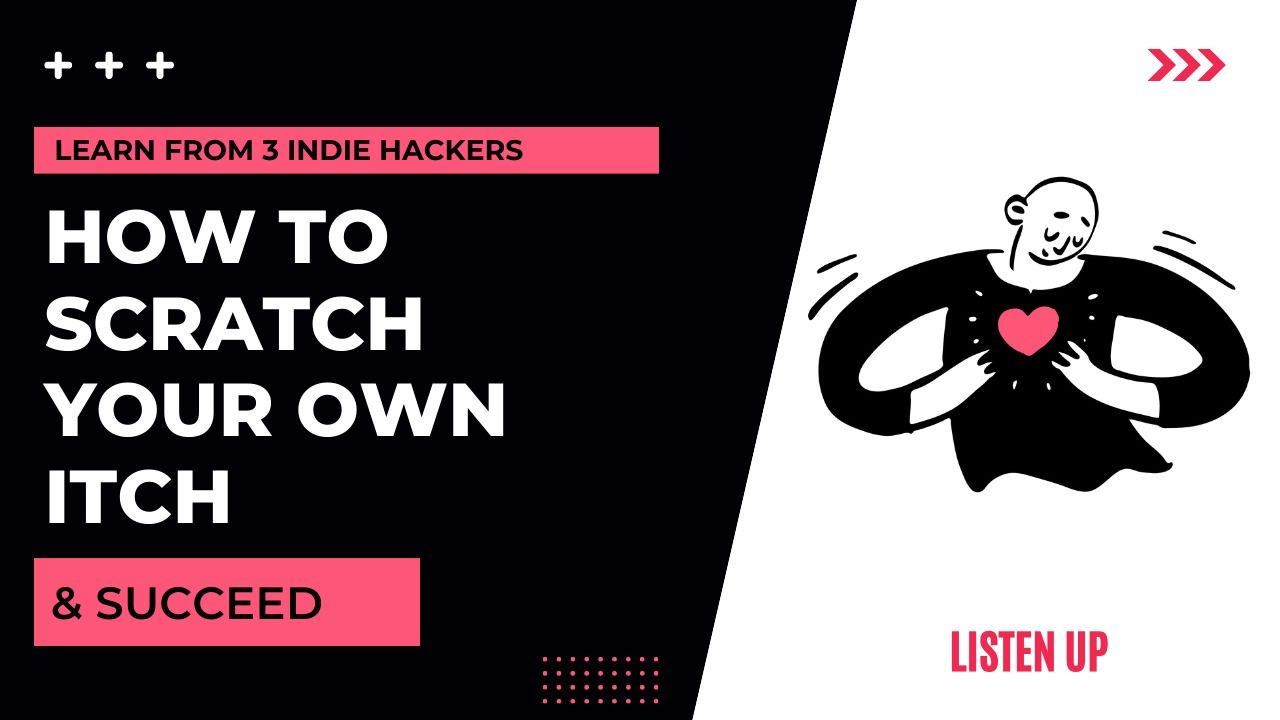3 Examples of Founders who scratched their own itch and succeeded🏆

Scratching your own itch can be a great way to generate business ideas.
But only if you can find a critical mass of people who face the same problems as you face.
And they are willing to pay money for the problem to be solved.
When you’re starting out, the best thing you can do is build something that solves your own problems.
Instead of waiting for new ideas to strike.
Let’s see 3 examples of Indie Hackers who found success by following this route.
1. Ryan Hoover | Product Hunt
Ryan was a product manager and marketer passionate about products.
He used to browse new products on the iOS Appstore and AngelList every day.
But they weren’t product discovery platforms.
He also used Facebook and Twitter to share his favorite products with his friends. But they were social media platforms.
What Ryan really wanted was a simple list.
A list of new and interesting products that he could scroll through.
That’s why back in 2013 he started a simple newsletter, where he curated new products every day. And shared with a small audience.
That was the bare-bones version of the Product Hunt community.
Eventually, the mailing list turned into the wildly successful platform that Product Hunt is today.
It all started when Ryan wanted to solve a problem for himself and there were no existing solutions available for it.
Read the full story of Ryan Hoover and Product Hunt:

2. Kyle Gawley | Gravity
Kyle had crashed and burnt while trying to build a venture-funded startup.
The crazy work hours had taken a serious toll on his physical health. It was so bad that he ended up in the emergency room.
Eventually, when he recovered Kyle resolved to have a better work-life balance. And he wanted to travel the world.
He got into digital nomadism now, and lived and worked in places like Bali, Vietnam, and Thailand.
Kyle settled down in Chiang Mai, Thailand as an ex-pat.
He didn’t want to build a VC-funded start-up again**, he wanted to build SaaS apps that he can run and profit from independently.**
He realized that it will take him a few iterations and several SaaS apps to fail before he will hit upon the successful one.
So he wrote some boilerplate code that he could use across all his projects. It covered the basics of a SaaS app like authentication, Stripe payments, and a basic user interface.
He showed it to a friend at a co-working space, and the friend suggested that this should be his product.
Kyle thought nobody would buy this, software engineers would prefer coding their own solution.
But to his surprise, he found a thriving market for his boilerplate amongst fellow Indie Hackers.
Gravity has become a profitable business for Kyle.
And it all started when he wanted to make some boilerplate code for his own use.
Read the full story of Kyle Gawley and his product Gravity:

3. Jordan O’Connor | Closet Tools
Jordan O’Connor graduated from school with a ton of debt.
He had a family to support and his day job was only able to help them break even every month.
Jordan needed a way to break out of this cycle. He didn’t know any web development, he only knew how to code in C.
For 3 years Jordan learned monetizable skills on the side. Skills like SEO, Copywriting, and Web Development.
As a side gig, his wife used to sell apparel on the fashion marketplace Poshmark.
Poshmark is this social marketplace where you can sell your designer clothes and shoes.
Users have to share and re-share their products constantly to reach new users and make sales on the platform.
That’s a time-consuming task.
Jordan offered to automate this process for his wife. He wrote a simple 30-line chrome bookmarklet to automate the sharing.
The script worked.
He launched it for free to some users and the r/poshmark subreddit.
People jumped on the solution.
With feedback and validated demand, he realized this could work as a product.
He built the front end of the tool in a month, integrated payments with Stripe, and had 10 paying customers right from day 1.
He called it Closet Tools.
At its peak, Closet Tools was doing $41K MRR.
And it all started when Jordan wanted to solve a simple problem for his wife.
Read a deep dive into the growth strategies and actionable insights from the success of Closet Tools:

All of these were Indie Hackers who found success while trying to solve their own problems. “Scratch your own itch” might not work always, but it gets you in the building mindset.
It gets your creative juices flowing and can become the launchpad for your eventual success.
So don’t wait for new ideas to come to you.
Look around at the problems you or your close ones face and build products to solve them.
ICYMI
Recent posts on Listen Up IH:
- The Solo Founder Playbook | How most startups fail but all founders succeed.
- 3 examples of How Founders leveraged their network to build profitable businesses
- 7 Habits of Highly Effective Indie Hackers
Thank you for reading.
Hope you enjoyed this post, do let me know on Twitter.
Every week, I share the most actionable insights and inspiring tips from successful Indie Hackers FOR aspiring Indie Hackers
Ideas + Insights + Inspiration for building profitable internet businesses💪
Sign up to Listen Up! IH and join 1900+ spirited Indie Hackers who read this newsletter every week.
Cheers,
Ayush


